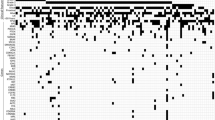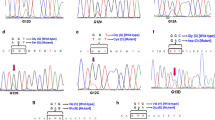Abstract
Mutation rates determined by allele-specific PCR can be highly different in KRAS exon 2 mutant colorectal carcinoma (CRC) samples suggesting intratumoural heterogeneity. To address the effect of KRAS gene copy number on the relative mutant allele frequency the KRAS locus was individually quantified following FISH analysis in 36 cases. We observed, that mutant KRAS status was associated with an elevated KRAS locus number (2.36 ± 0.42 vs 2.63 ± 0.75; p = 0.037) reflecting an increased aneuploidy status but no true amplification of the locus. In parallel, KRAS locus copy numbers showed significant intercellular variability (1–16 copies/cell nucleus) within individual tumours also indicating to a dynamic intratumoural oscillation of the mutant allele copy number. In conclusion, aneusomy is a common feature of KRAS mutant CRC and KRAS copy number variations may have an impact on the relative mutant allele frequency detected by allele specific PCR/sequencing), potentially leading to subclonal diversity and influencing tumour behaviour.






Similar content being viewed by others
References
Neumann J, Zeindl-Eberhart E, Kirchner T, Jung A (2009) Frequency and type of KRAS mutations in routine diagnostic analysis of metastatic colorectal cancer. Pathol Res Pract 205(12):858–862
Lièvre A, Bachet JB, Le Corre D et al (2006) KRAS mutation status is predictive of response to cetuximab therapy in colorectal cancer. Cancer Res 66(8):3992–3995
van Krieken JH, Jung A, Kirchner T et al (2008) KRAS mutation testing for predicting response to anti-EGFR therapy for colorectal carcinoma: proposal for an European quality assurance program. Virchows Arch 453(5):417–431
Amado RG, Wolf M, Peeters M et al (2008) Wild-type KRAS is required for panitumumab efficacy in patients with metastatic colorectal cancer. J Clin Oncol 26(10):1626–1634
Karapetis CS, Khambata-Ford S, Jonker DJ et al (2008) K-ras mutations and benefit from cetuximab in advanced colorectal cancer. N Engl J Med 359(17):1757–1765
Yu S, Xiao X, Lu J, Qian X, Liu B, Feng J (2013) Colorectal Cancer Patients with Low Abundance of KRAS Mutation May Benefit from EGFR Antibody Therapy. PLoS One 8(7)
Dócs O, Fazakas F, Horváth NL et al (2015) Changes of KRAS exon 2 codon 12/13 mutation status in recurrent colorectal cancer. Pathol Oncol Res 21(2):399–404
Bakhoum SF, Compton DA (2012) Chromosomal instability and cancer: a complex relationship with therapeutic potential. J Clin Invest 122(4):1138–1143
Orum H, Nielsen PE, Egholm M, Berg RH, Buchardt O, Stanley C (1993) Single base pair mutation analysis by BNA directed PCR clamping. Nucleic Acids Res 21(23):5332–5336
Cappuzzo F, Hirsch FR, Rossi E et al (2005) Epidermal growth factor receptor Gene and Protein and Gefitinib sensitivity in non–small-cell lung cancer. J Natl Cancer Inst 97(9):643–655
Fehrmann RS, Karjalainen JM, Krajewska M et al (2015) Gene expression analysis identifies global gene dosage sensitivity in cancer. Nat Genet 47(2):115–125
Moroni M, Veronese S, Benvenuti S et al (2005) Gene copy number for epidermal growth factor receptor (EGFR) and clinical response to antiEGFR treatment in colorectal cancer: a cohort study. Lancet Oncol 6(5):279–286
Seth R, Crook S, Ibrahem S, Fadhil W, Jackson D, Ilyas M (2009) Concomitant mutations and splice variants in KRAS and BRAF demonstrate complex perturbation of the ras/Raf signalling pathway in advanced colorectal cancer. Gut 58(9):1234–1241
Valtorta E, Misale S, Sartore-Bianchi A et al (2013) KRAS gene amplification in colorectal cancer and impact on response to EGFR-targeted therapy. Int J Cancer 133(5):1259–1265
Herrera LA, Prada D, Andonegui MA, González AD (2008) The epigenetic origin of aneuploidy. Curr Genomics 9(1):43–50
Hegyi K, Méhes G (2012) Mitotic failures in cancer: aurora B kinase and its potential role in the development of aneuploidy. Pathol Oncol Res. 18(4):761–769
Soh J, Okumura N, Lockwood WW et al Oncogene mutations, copy number gains and mutant allele specific imbalance (MASI) frequently occur together in tumour cells. PLoS One s4(10):e7464
Acknowledgment
This work was supported by the project grant TÁMOP-4.2.2. A-11/1/KONV-2012-0045 of the European Union with cooperation with the European Social Fund.
Author information
Authors and Affiliations
Corresponding author
Rights and permissions
About this article
Cite this article
Dócs, O., Hegyi, K., Mokánszky, A. et al. Mutant KRAS Status Is Associated with Increased KRAS Copy Number Imbalance: a Potential Mechanism of Molecular Heterogeneity. Pathol. Oncol. Res. 23, 417–423 (2017). https://doi.org/10.1007/s12253-016-0126-x
Received:
Accepted:
Published:
Issue Date:
DOI: https://doi.org/10.1007/s12253-016-0126-x




